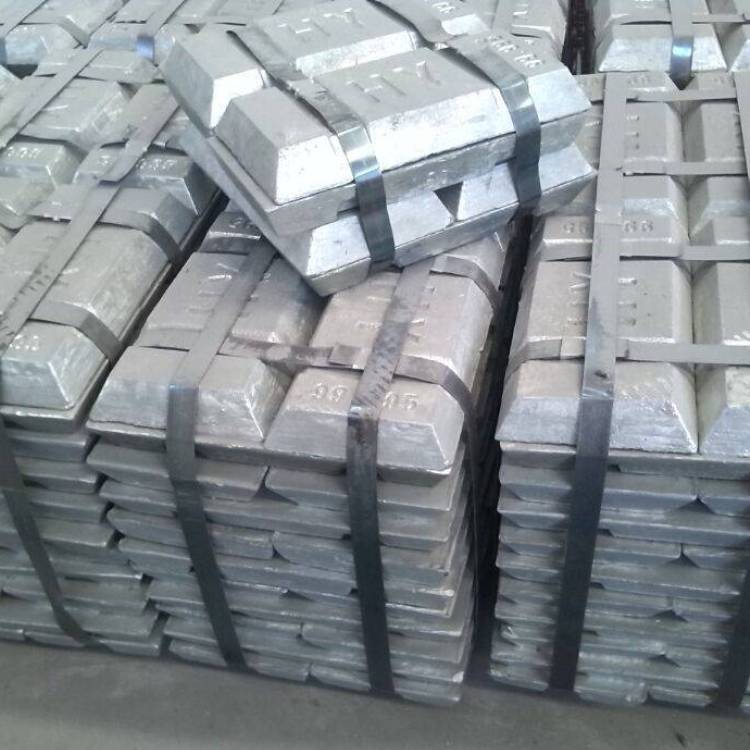Zinc is a modest hero of the metal world, unpredicted but utterly pivotal to many industries. Zinc ingots are at the core of zinc's industrial value: solid, rectangular bars of pure zinc that form a basic building block in industry and technology. These humble blocks of metal have a central role in everything from building to high-tech electronics and are thus a key part of modern industrial manufacturing.
Zinc, a bluish-white metal, has been familiar to humans for centuries, with its extensive industrial application dating back to the late 18th century. Zinc ingots today are a pure, refined form of this useful metal, processed with great care to satisfy the stringent requirements of numerous industrial uses.
What are zinc ingots? ingots
Zinc and other ingots are produced using crystallization, strong state, and other very high decontamination techniques, such as sublimation. Zinc ingots are versatile and are particularly useful in corrosion resistance. Most of the volume manufactured is utilized for galvanizing. Zinc ingots can form an anti-corrosion process for steel products and can be used to cast small components.
Zn can recognize zinc as a chemical symbol with a silvery-blue appearance. Zinc metal can be applied in various industries. These ingots can be classified into standard and large ingots and their grade, for instance, high-quality grade, continuous galvanizing grade, high grade, etc.
The metal is abundant in the earth's crust and finds numerous industrial and biological uses. It is brittle at room temperature and blue and white in color, but can be polished to a lighter shade. The metal is mainly utilized for galvanized steel, a process that shields the metal from unwanted corrosion. Zinc alloys, such as brass, find significant use in a variety of applications, ranging from corrosion-resistant marine parts to musical instruments.
Manufacturing Process
The journey of a zinc ingot begins deep underground in zinc ore deposits. The primary ore, known as zinc blende or sphalerite, is extracted through mining operations. The raw ore undergoes a complex series of processing steps:
- Concentration: Ore is crushed and processed to increase zinc content
- Roasting: Concentrated ore is heated to convert zinc sulfide to zinc oxide
- Leaching: Chemical processes extract pure zinc from the oxide
- Electrolysis: Zinc is electrically separated and purified
- Casting: Molten zinc is poured into molds to create ingots
Typical zinc ingots are produced with a purity of 99.95% or higher, ensuring consistent quality for industrial use.
Physical and Chemical Properties
Zinc ingots possess remarkable characteristics that make them invaluable in industrial applications:
- Melting Point: Approximately 419.5°C (787.1°F)
- Density: 7.14 g/cm³
- Tensile Strength: 100-150 MPa
- Corrosion Resistance: Exceptional ability to resist atmospheric oxidation
- Malleability: Can be easily formed and shaped at room temperature
Primary Industrial Applications
A. Metallurgy and Galvanization
Galvanization represents zinc's most recognized application. By coating steel or iron with a protective zinc layer, manufacturers create materials that resist rust and corrosion. This process is crucial in:
- Infrastructure construction
- Automotive manufacturing
- Agricultural equipment
- Outdoor signage and structures
The hot-dip galvanization process involves immersing steel components in molten zinc, creating a metallurgical bond that provides long-lasting protection.
B. Alloy Production
Zinc is a key component in several important alloys:
Brass: Zinc and copper create a versatile, corrosion-resistant material used in:
- Plumbing fixtures
- Musical instruments
- Electrical components
2. Die-casting Alloys: Zinc-aluminum alloys are essential in
- Automotive parts
- Consumer electronics
- Precision mechanical components
C. Electronics and Technology
Modern technology relies heavily on zinc ingots.
- Semiconductor manufacturing
- Rechargeable battery production
- Solar panel component fabrication
- Specialized electrical contacts and connectors
Emerging Uses of Zinc Ingots
Innovative applications are expanding zinc's potential:
- Renewable Energy: Zinc-air batteries for grid storage
- Green Construction: Sustainable building materials
- Medical Technology: Specialized medical implants and devices
- Nanotechnology: Advanced material development
Selecting and Sourcing Zinc Ingots
A. Quality Considerations
When purchasing zinc ingots, critical factors include:
- Purity Levels: Typically classified as Special High Grade (SHG) at 99.995% pure
- International Grading Standards: ASTM, ISO certifications
- Chemical Composition Analysis
- Physical Integrity of the ingot
B. Purchasing Guidelines
Buying zinc ingots requires careful consideration.
- Suppliers: Verify reputation and certification
Pricing Factors:
- Global zinc market conditions
- Ingot size and purity
- Quantity purchased
Purchasing Options:
- Direct from manufacturers
- Industrial supply distributors
- Online metallic marketplaces
Environmental and Economic Impact
Zinc's environmental narrative is increasingly positive.
- Recyclability: Nearly 30% of zinc comes from recycled sources
- Sustainable Production: Improving mining and processing techniques
- Economic Significance: Global zinc market is valued at over $40 billion annually
Conclusion: Select the Best Zinc Ingots for Your Use
Zinc ingots are much more than mere blocks of metal. They are the actual basics of modern industrial infrastructure, propelling innovation in a wide range of industries. From safeguarding critical infrastructure to powering cutting-edge technologies, zinc continues to demonstrate its value in our sophisticated world.
For those interested in materials science or industrial processes, zinc ingots provide an interesting window into the complex realm of metallurgy and production. Additionally, chemical companies in UAE play a crucial role in the supply and distribution of high-quality zinc ingots, ensuring industries have access to the essential materials needed for manufacturing and development.
